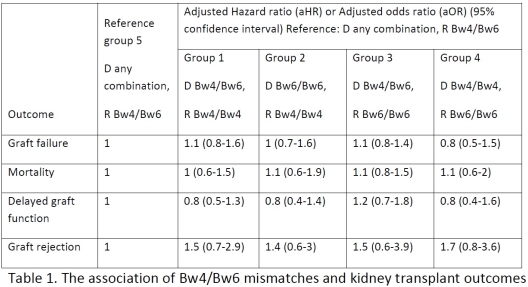Impact of Bw4 and Bw6 Epitope Mismatch on Clinical Outcomes after Renal Transplantation
1Washington University in St. Louis, St. Louis
2Johns Hopkins University, Baltimore
3Saint Louis University, St. Louis.
Meeting: 2018 American Transplant Congress
Abstract number: A137
Keywords: HLA antigens, Outcome
Session Information
Session Name: Poster Session A: Kidney Complications: Late Graft Failure
Session Type: Poster Session
Date: Saturday, June 2, 2018
Session Time: 5:30pm-7:30pm
 Presentation Time: 5:30pm-7:30pm
Presentation Time: 5:30pm-7:30pm
Location: Hall 4EF
HLA class II epitope mismatch has been shown to impact the long-term survival of kidney allografts. HLA-B alleles are traditionally grouped by the Bw4 and Bw6 epitopes, two highly immunogenic public epitopes. The impact of Bw4/Bw6 mismatch in kidney transplant patients has not been examined in the current era.
We examined Organ Procurement and Transplantation Network (OPTN) data for 1380 decreased donor kidney transplant recipients with available donor (D) and recipient (R) data o<ins cite="mailto:Krista%20Lentine" datetime="2017-12-01T12:54">n</ins>f</del> Bw4/Bw6 alleles (2000 to 12/2016). According to the mismatches, recipients were categorized into; group 1 (D Bw4/Bw6, R Bw4/Bw4, n=143), group 2 (D Bw6/Bw6, R Bw4/Bw4, n=80), group 3 (D Bw4/Bw6, R Bw6/Bw6, n=271), group 4 (D Bw4/Bw4, R Bw6/Bw6, n=61), and group 5 (D any combination, R Bw4/Bw6, n=825). Associations of Bw mismatches with transplant outcomes (adjusted odds ratio, 95% LCL aOR 95% UCL) were quantified by multivariate regression including adjustment for donor, recipients, and transplant factors.
Compared to group 5 (with zero Bw mismatch), there was no significant association between group 1 to group 4 with kidney allograft failure and patient death. In addition, there was no increased risk for delayed graft function and acute rejection within one year of transplant. Comparison of combined groups 1 and 2 (contains 1 or 2 mismatched Bw6), or groups 3 and 4 (contains 1 or 2 mismatched Bw4) showed no significant association with inferior transplant outcomes compared to group 5. 
Conclusion: There is no significant impact of Bw4/Bw6 epitope mismatch on the transplant outcomes. However, further study is warranted to examine whether the presence of Bw4 epitope in a few HLA-A antigens (A23, 24, 25, 32) and Bw6 epitope in a few HLA-C antigens (e.g. Cw1, 7, 8 etc.) may have provided protection against adverse outcomes despite apparent Bw4/Bw6 mismatches.
CITATION INFORMATION: Liu C., Brennan D., Lentine K., Delos Santos R., Li J., Malone A., Alhamad T. Impact of Bw4 and Bw6 Epitope Mismatch on Clinical Outcomes after Renal Transplantation Am J Transplant. 2017;17 (suppl 3).
To cite this abstract in AMA style:
Liu C, Brennan D, Lentine K, Santos RDelos, Li J, Malone A, Alhamad T. Impact of Bw4 and Bw6 Epitope Mismatch on Clinical Outcomes after Renal Transplantation [abstract]. https://atcmeetingabstracts.com/abstract/impact-of-bw4-and-bw6-epitope-mismatch-on-clinical-outcomes-after-renal-transplantation/. Accessed February 18, 2026.« Back to 2018 American Transplant Congress
